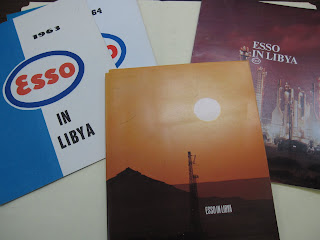Turns out, the collection from Robert Stine, long-time patron of the Museum, dealt with the building of the Trans-Alaskan Pipeline in the 1970s AND the ESSO (now EXXON) oil industry in Libya in the 1960s.
Finding materials about the oil industry in Libya? How timely, considering the current events happening. I knew that Libya was an "oil-rich" nation in northern Africa. But I did not know much about its political or economic history.

Above: Some of the materials included in the Robert Stine Collection (2011-002).
After a little digging (thanks to Wikipedia and the New York Times online), I discovered that Libya was a kingdom prior to 1969. All of the ESSO materials in this particular collection pertaining to Libya date prior to 1969. Turns out, the Libyan kingdom was pro-Western and friendly with Western countries such as the U.K. and the U.S. According to one of the publications ESSO in Libya 1963:
"The Libyan Petroleum Law became effective in June 1955 and Esso Libya applied for, and was granted, nine concession areas covering about 100,000 sq.kms. The company then began the painstaking search for oil."
"Esso was the first:
* To discover oil in Libya
* to build a crude oil pipeline to the sea
* to build a marine terminal
* to produce and export oil to foreign markets
* to build a refinery in the country to produce processed oil products for local consumption
* and among the first to agree to the Petroleum Law Amendments of 1961."
On 1 September 1969, a small group of military officers led by then 27-year-old army officer Muammar Gaddafi staged a coup d'état against King Idris, launching the Libyan Revolution. After the coup, Gaddafi closed American and British bases and partially nationalized foreign oil and commercial interests in Libya.
An interesting story ...
No comments:
Post a Comment